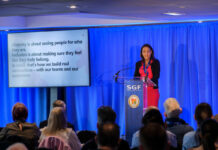Pressure mounts across the industry

INDUSTRY experts have voiced concerns after food inflation hit its highest rate in over 45 years, according to official data.
The Office for National Statistics (ONS) reported that food and non-alcoholic beverage prices rose by 18.2% in the year to the end of February.
The ONS said that the last time food inflation was this high was in August 1977, when it was estimated to sit at 21.9%.
David Thomson, chief executive at Food and Drink Federation Scotland, said: “The acceleration in food and drink inflation to 18.2% will come as disappointing news for households. It reflects the continued, significant pressure the food and drink sector is under as businesses grapple with persistent cost rises.”
The ONS has put this rise down to the cost of vegetables, which saw a great deal of shortages during February due to weather conditions as well as continued supply chain issues.
This follows on from Kantar reports that found grocery price inflation had risen to 17.5% during the four weeks to 19 March, the highest-ever level recorded by the marketing firm and the second month in a row that this figure stayed above 17%.
Kantar said this means shoppers now face an additional £837 increase to their average annual shopping bill.
Fraser McKevitt, head of retail and consumer insight at Kantar, said: “Unfortunately, it’s more bad news for the British public, who are experiencing the ninth month of double-digit grocery price inflation.”
Chancellor of the exchequer Jeremy Hunt vowed in his spring budget to cut inflation down to 2.9% by the end of the year – in line with predictions from the Office of Budget Responsibility.
However, industry members have called Hunt’s decisions into question, claiming they will only further the financial pressures on households.
Luke McGarty, head of policy and public affairs at the Scottish Grocers’ Federation, said: “Alongside rising energy costs, increases to duty on alcohol and tobacco, and higher corporation tax will ultimately be passed on to the customer, struggling households and communities.”


















